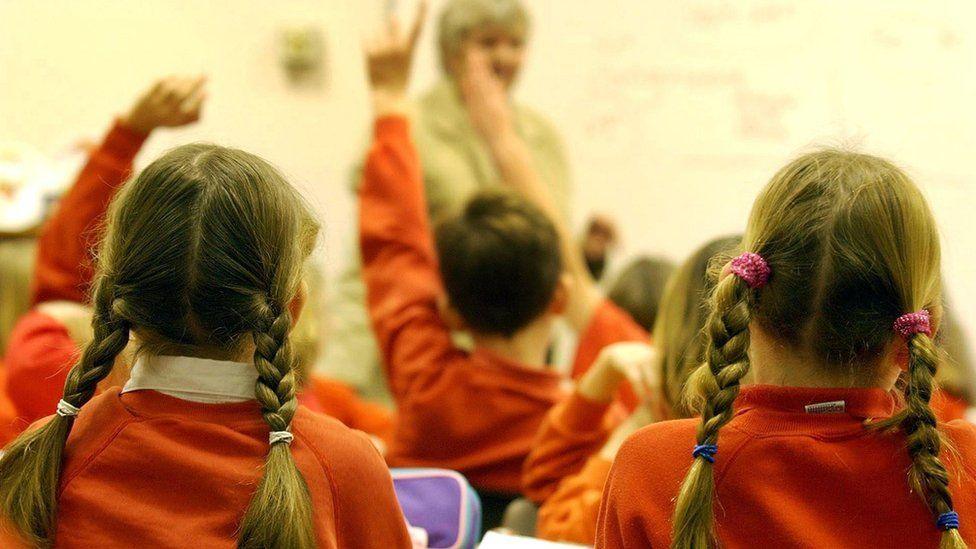Christian-focused RE in Northern Ireland primary schools 'unlawful'
- Published

The exclusively Christian-focused religious education (RE) taught at primary schools in Northern Ireland is unlawful, the High Court has ruled.
A judge held the curriculum breaches human rights as it does not approach religious education in an "objective, critical and pluralist manner".
The verdict came in a legal challenge by a father and daughter to the current syllabus in controlled primary schools.
Proceedings were brought against the Department of Education.
The challenge was on behalf of a seven-year-old girl who attends a school in Belfast.
Mr Justice Colton said the "unlawfulness identified requires a reconsideration of the core curriculum" in how it sets out the teaching of religious education (RE) and the provision of collective worship.
The child's lawyers argued that the complete focus on Christianity in RE and collective worship, to the exclusion of all other faiths, violates education entitlements protected by the European Convention on Human Rights (ECHR).
Described as a non-religious family, the child's parents expressed concerns that she may adopt a specific worldview.

Despite not objecting to most of the focus being on Christianity, they alleged that no meaningful alternative teaching is available in Northern Ireland's state-funded primary schools.
In a challenge which centred on provisions in the Education and Libraries (NI) Order 1986, it was contended that the current arrangements lack pluralism and involves promoting the Christian faith.
Counsel for the Department of Education insisted the system was flexible and lawful, with potential scope for supplementing the statutory syllabus.
But Mr Justice Colton said: "It is no answer that the core curriculum is a minimum requirement if it has the effect of failing to provide religious education in an objective, critical and pluralist manner."
Exclusion concerns valid
He cited a statement that the department has no knowledge of whether individual schools provide additional opportunities for pupils to learn about other religions or none.
"This is a damning admission and, in the court's view, emphasises the need for a reappraisal of the core curriculum in so far as it relates to RE and the provision by schools of CW (collective worship)," the judge found.
With the girl's father expressing fears that she could be isolated or bullied if they had taken the step of having her excluded from religious education or collective worship activities, Mr Justice Colton held that those concerns were valid.
"Whilst an unfettered right to exclusion is available it is not a sufficient answer to the lack of pluralism identified by the court," he said.
"There is a danger that parents will be deterred from seeking exclusion for a child. Importantly, it also runs the risk of stigmatisation of their children."
A solicitor representing the family predicted the judgment would have wider significance for religious education within Northern Ireland's schools.
Darragh Mackin, of Phoenix Law, said: "The court has ruled that the core curriculum needs to be changed so it teaches children about Christianity, as opposed to being Christians - that is not the job of a school."
The Transferor Representatives' Council (TRC), the body which represents the three main Protestant churches in schools - Presbyterian, Church of Ireland and Methodist, described the ruling as "an important and significant issue".
"The teaching of RE and collective worship in controlled primary schools is an important matter," a spokesman said.
"We will be reflecting on today's decision over the coming weeks, and any subsequent final order that Mr Justice Colton may make.
"We will also need to take the time to discuss the matter as churches together."